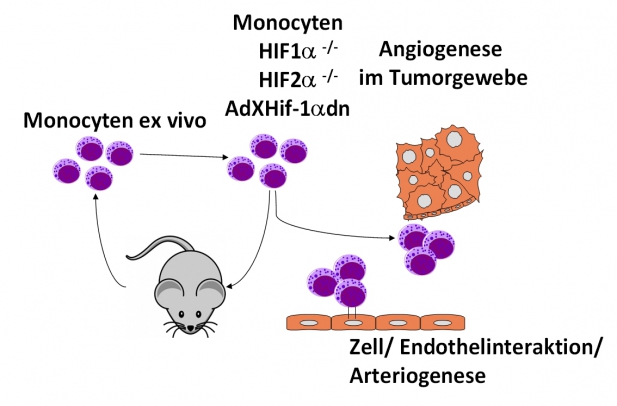Subproject 8: The influence of Hypoxia induced factors (Hif) on the angiogenetic potential for tumor associated macrophages
Clinic for Kardiology, Angiology and Pneumology: Braun-Dullaeus R / Herold J
Leibniz Institute for Neurobiology (LIN), Magdeburg: Zuschratter W
In dem Projekt soll die Auswirkung einer immun-modulatorischen Zell-Therapie zur Förderung des Kollateralenwachstums weiter differenziert werden, wobei der Schwerpunkt auf der Untersuchung Hypoxie-regulierter Gene transplantierter Monozyten liegt (Abbildung). Folgende Fragen sollen dabei beantworten werden: „Haben die zur Förderung der Kollateralenentwicklung eingesetzten Antigen-beladenen Monozyten einen Einfluss auf die Tumor-Angiogenese? Aus dieser Fragestellung und unseren bisherigen Vorversuchen, die zeigen, dass eine adenoviral induzierte Expression der dominant negativen Mutante (AdXHif-1αdn) in den Monozyten die Expression von Hif-1α und Hif-2α und damit unter hypoxischen Bedingungen die Induktion von VEGF-A, PDGF-BB, PGF und Angiopoetin als wichtigste pro-angiogenetische Faktoren hemmt, möchten wir eine therapeutische Strategie erarbeiten: Hoch arteriogene Antigen-beladene Monozyten sollen durch eine adenovirale Modifikation mit der dominant negativen Mutante (AdXHif-1αdn) modifiziert werden, um neben ihrem bekannten therapeutischen Einsatz auch die Tumorangiogenese zu reduzieren. Als Modell eines Tumor-Mikromilieus soll ein Matrigel dienen. Auf diese Weise könnte die von uns postulierte negative Wirkung der transplantierten Monozyten auf die Tumorvaskularisation vermieden werden. Die im Speziallabor für Imaging (Leibniz-Institut) vorhandene Expertise für in vivo Bildgebung soll zur Analyse der Tumor-Monozyten Interaktion angewandt werden.
In this project, the effects of immunomodulatory cell therapy on the support of collateral growth are to be differentiated further, with the research focus being on the examination of hypoxia regulated gene transplanted monocytes (Figure). During this research, the following questions should be answered: “ Does the collateral development of applied antigen-loaded monocytes have an influence on the tumor angiogenesis?” From this thesis and our experiments leading up to this project, it can be shown that adenoviral induced expression of dominate negative mutants (AdXHif-1αdn) in the monocytes inhibits the expression of Hif-1α und Hif-2α and thus the induction of VEGF-A, PDGF-BB, PGF and angiopoietin as the most important angiogenetic factors under hypoxic conditions. Because of this, we would like to develop a therapeutic strategy: high arteriogenic antigen-loaded monocytes are to be modified using an adenoviral modification with the dominant negative mutant (AdXHif-1αdn) in order to reduce the tumor angiogenesis in addition to using their known therapeutic effects. The model for the microenvironment is a Matrigel. With this method, the posited negative effect of transplanted monocytes on the tumor vascularization could be prevented. The expertise of the special laboratory for imaging (Leibniz Institute) for the generation of in vivo images will be used to analyze the tumor monocyte interaction.
 |
|
Abbildung:Project Overview. The scientific goal is to investigate the effect of an immunomodulatory cell therapy on the support of collateral growth on the undesirable angiogenesis. For this, the role of hypoxia-regulated genes in particular will be analyzed and an anti-angiogenetic approach for the prevention of tumor vascularization will be developed. |






